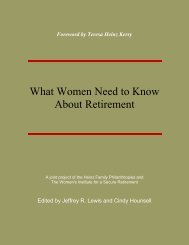What Women Need to Know About Retirement - Wiser
What Women Need to Know About Retirement - Wiser
What Women Need to Know About Retirement - Wiser
You also want an ePaper? Increase the reach of your titles
YUMPU automatically turns print PDFs into web optimized ePapers that Google loves.
Buying Individual Bonds<br />
If you have more money <strong>to</strong> invest and can s<strong>to</strong>mach a little more risk in order <strong>to</strong> get a higher<br />
return, there are a few things you need <strong>to</strong> consider. The government sells marketable securities,<br />
known as Treasury bills, notes, bonds, and TIPS (Treasury Inflation-Protected Securities), with<br />
maturities ranging from one month <strong>to</strong> 30 years. Treasury securities are considered among the<br />
safest in the world in terms of default risk, but tend <strong>to</strong> pay a slightly higher coupon rate<br />
compared <strong>to</strong> savings bonds or I Bonds. You can buy these in $1,000 increments from the<br />
government’s TreasuryDirect.gov Web site. You can buy them from a broker as well (see<br />
below), but it’s cheaper <strong>to</strong> get them direct from the source.<br />
To tempt inves<strong>to</strong>rs away from the relative safety of Treasury bonds, other issuers have <strong>to</strong> offer<br />
higher coupon rates—and the riskier the issuer, the higher the rate. For example, agencies like<br />
the Federal National Mortgage Association (“Fannie Mae”) and the Federal Home Loan<br />
Mortgage Corporation (“Freddie Mac”) issue bonds that aren’t officially backed by the U.S.<br />
Treasury, and so carry a higher coupon rate.<br />
State and local governments also issue bonds <strong>to</strong> fund various projects, again with a somewhat<br />
higher risk of default. Most of these bonds also carry lower coupon rates than federal<br />
government bonds, however the interest on these bonds is generally exempt from federal income<br />
taxes and (in some cases) from state and local income taxes as well, which makes them more<br />
desirable <strong>to</strong> inves<strong>to</strong>rs in high tax brackets. Generally, these bonds are not a wise choice for<br />
lower-income inves<strong>to</strong>rs. It is important <strong>to</strong> compare returns on an after-tax basis.<br />
Corporations and foreign governments also issue bonds. Much like people, different companies,<br />
countries, and government issuers have different credit ratings that gauge the likelihood that<br />
they’ll be able <strong>to</strong> meet their debt obligations. In general, the better the credit rating, the lower the<br />
risk of something going wrong—and usually, the lower the coupon rate will be.<br />
You can buy corporate bonds from a broker, usually in $1,000 chunks, but it can get very<br />
expensive, especially if you’re only buying a few bonds at a time. Bonds purchased through<br />
brokers often include a mark-up in price that is imbedded in the transaction cost. Every broker<br />
has different rules and charges different fees; in general, expect <strong>to</strong> pay a minimum of $20 <strong>to</strong> $50<br />
or more, depending on how many bonds you’re buying. The added cost of purchase reduces the<br />
effective yield you receive on the bond.<br />
<strong>What</strong> Is a Bond Mutual Fund?<br />
Since most types of corporate and government bonds (with the exception of savings bonds) carry<br />
a price tag of $1,000 or more per bond, it can be hard for the average person <strong>to</strong> put <strong>to</strong>gether a<br />
truly diversified bond portfolio. The sheer variety of bonds available also makes it difficult <strong>to</strong><br />
choose which ones are best for you. Should you buy a one-year bond or a 30-year bond with<br />
your $1,000? Should you buy it from the government or a corporate issuer? And if the bond is<br />
from a corporate issuer, which one should you choose?<br />
Many mutual funds invest in bonds. Just as bonds are less risky than s<strong>to</strong>cks, bond mutual funds<br />
tend <strong>to</strong> be less risky than s<strong>to</strong>ck mutual funds, but pay generally lower returns. There are<br />
exceptions. Junk bond funds, for example, can be as risky as many s<strong>to</strong>ck funds.<br />
28




